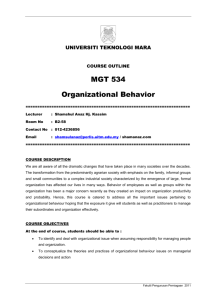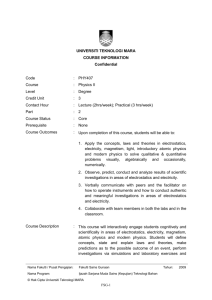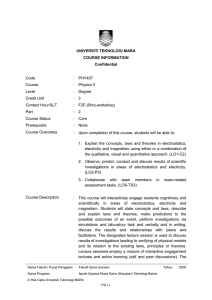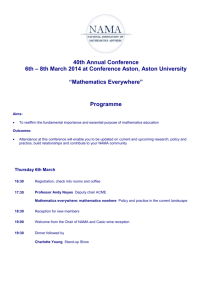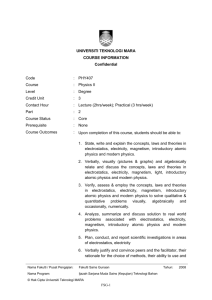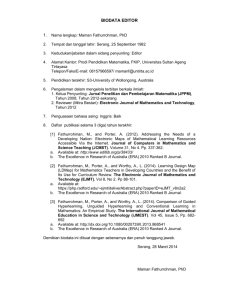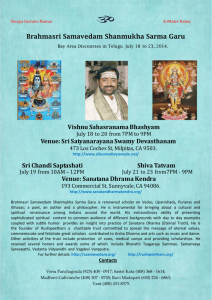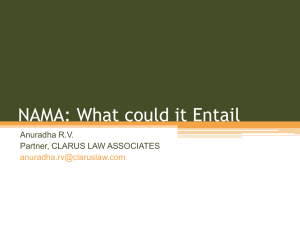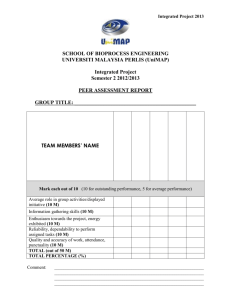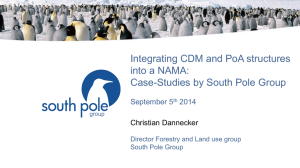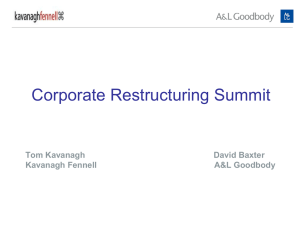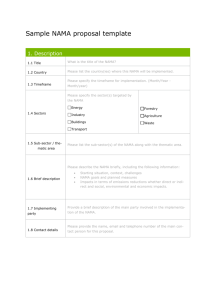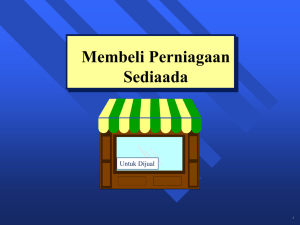SILIBUS MGT162
advertisement
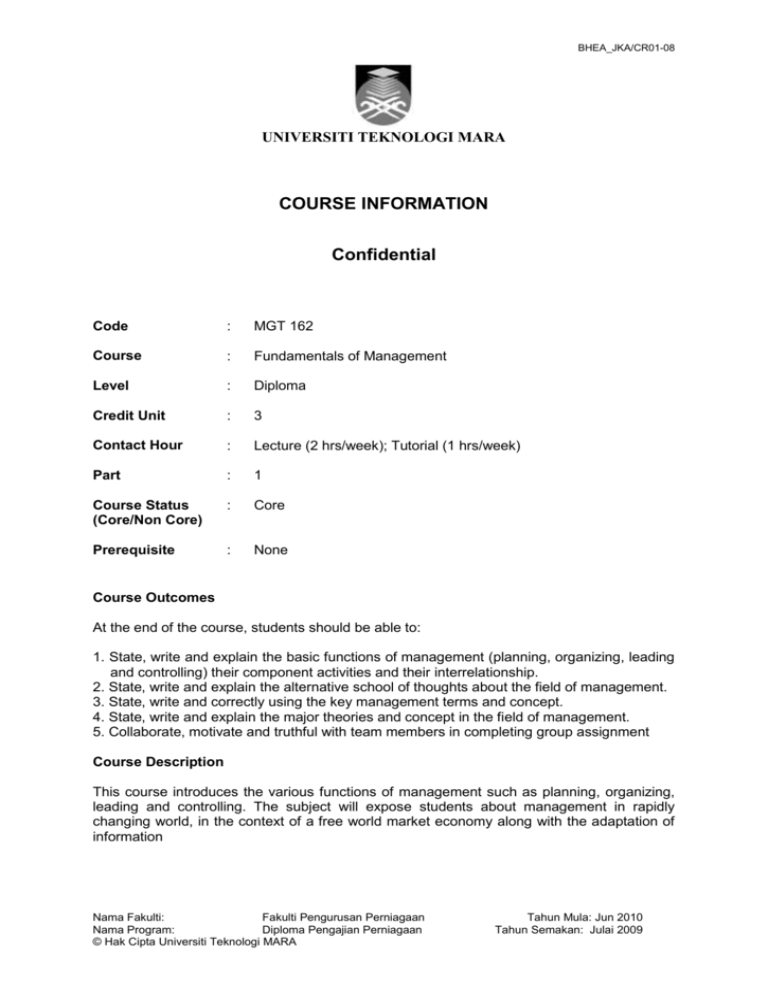
BHEA_JKA/CR01-08 UNIVERSITI TEKNOLOGI MARA COURSE INFORMATION Confidential Code : MGT 162 Course : Fundamentals of Management Level : Diploma Credit Unit : 3 Contact Hour : Lecture (2 hrs/week); Tutorial (1 hrs/week) Part : 1 Course Status (Core/Non Core) : Core Prerequisite : None Course Outcomes At the end of the course, students should be able to: 1. State, write and explain the basic functions of management (planning, organizing, leading and controlling) their component activities and their interrelationship. 2. State, write and explain the alternative school of thoughts about the field of management. 3. State, write and correctly using the key management terms and concept. 4. State, write and explain the major theories and concept in the field of management. 5. Collaborate, motivate and truthful with team members in completing group assignment Course Description This course introduces the various functions of management such as planning, organizing, leading and controlling. The subject will expose students about management in rapidly changing world, in the context of a free world market economy along with the adaptation of information Nama Fakulti: Fakulti Pengurusan Perniagaan Nama Program: Diploma Pengajian Perniagaan © Hak Cipta Universiti Teknologi MARA Tahun Mula: Jun 2010 Tahun Semakan: Julai 2009 BHEA_JKA/CR01-08 Syllabus Content 1.0 Introduction to Management 1.1 Definition of organization and management 1.2 Measuring managerial performance 1.3 Management process functions and activities 1.4 Managerial levels, skills and roles 1.5 Evolution of management thoughts 2.0 Planning 2.1 Definition of and the importance of planning 2.2 Types of planning and goals 2.3 Strategic Planning 2.4 Mission Statement 2.5 Types of organizational plan/ operational plan 3.0 The nature of decision making 3.1 Types of decision making 3.2 Types of condition under decision making 3.3 The rationale of decision making 3.4 Group decision making 4.0 Organizing 4.1 Definition of organizing 4.2 The organizing process 4.3 Division of work/ labor 4.4 Organizational structure 4.5 Span of management 4.6 Types of organization chart 4.7 Authority 4.8 Delegation 4.9 Coordination 5.0 Motivation 5.1 Definition of motivation 5.2 Early view on motivation 5.3 Content theories of motivation 5.4 Expectancy theory 5.5 Equity theory 5.6 Reinforcement theory 5.7 Goal-Setting theory 6.0 Leading 6.1 Definition of leadership 6.2 Leadership approaches 6.3 Power Nama Fakulti: Fakulti Pengurusan Perniagaan Nama Program: Diploma Pengajian Perniagaan © Hak Cipta Universiti Teknologi MARA Tahun Mula: Jun 2010 Tahun Semakan: Julai 2009 BHEA_JKA/CR01-08 7.0 Control 7.1 Definition of controlling 7.2 The controlling process 7.3 Types of control 7.4 Potential barriers to successful control 7.5 Making controlling success 8.0 Communication 8.1 The communication process 8.2 Formal organization communication 8.3 Informal organization communication 8.4 Barriers to effective communication and how to overcome them 8.5 Achieving effective communication 8.6 Categories of interpersonal communication 9.0 Quality 9.1 Definition of Quality and TQM 9.2 The important of quality 9.3 Tools of TQM 10.0 Management from Islamic Perspective 10.1 Philosophy and principles Islamic management 10.2 Examples on practice of Islamic organizations Teaching Methodology 1. Lecture-discussion 2. Group presentation Assessment Course Work: 40% Cognitive 35% Two tests 2 x10%= 20% Five quizzes 5 x 2% = 10% Group Report = 5% Communication Skills 5% Group Presentation =5% Final exam: Total 60% 100% Nama Fakulti: Fakulti Pengurusan Perniagaan Nama Program: Diploma Pengajian Perniagaan © Hak Cipta Universiti Teknologi MARA Tahun Mula: Jun 2010 Tahun Semakan: Julai 2009 BHEA_JKA/CR01-08 Recommended Text Lewis, P.S., Goodman, S. H. & Fandt, P. M. (2007). Tomorrow’s Leaders, 4th Edition, South-Western. Management: Challenges For References Certo, S. C. (1994), Modern Management: Quality, Ethics, and The Global Environment, 6th Edition, Prentice Hall Sheikh Farid, Management From The Islamic Perspective, Universiti Islam Antarabangsa. Tan Sri Dr. Mohammed Abdul Rauf, Management and Administration (An Islamic Perspective), Government Printing. Nama Fakulti: Fakulti Pengurusan Perniagaan Nama Program: Diploma Pengajian Perniagaan © Hak Cipta Universiti Teknologi MARA Tahun Mula: Jun 2010 Tahun Semakan: Julai 2009 BHEA_JKA/CR01-08 COURSE OUTCOMES – PROGRAM OUTCOMES MATRIX CENTRE OF STUDY COURSE CODE MGT 162 COURSE NAME FUNDAMENTALS OF MANAGEMENT CREDIT HOURS 3 UPDATED BY FACULTY OF BUSINESS MANAGEMENT PM ABDULLAH ABDUL KADIR JULAI 2009 DATE TEACHING METHODOLOGY PROGRAM OUTCOMES COURSE OUTCOMES PO1 1. State, write and explain the basic functions of management (planning, organizing, leading and controlling) their component activities and their interrelationship. PO2 PO3 PO4 PO5 PO6 PO7 PO8 PO9 PO10 PO11 Lecturediscussion 3 3 3 Nama Fakulti: Fakulti Pengurusan Perniagaan Nama Program: Diploma Pengajian Perniagaan © Hak Cipta Universiti Teknologi MARA 2 Tahun Mula: Jun 2010 Tahun Semakan: Julai 2009 ASSESSMENT Tests Quizzes Final Exam Group Report BHEA_JKA/CR01-08 2. State, write and explain the alternative school of thoughts about the field of management. 3. State, write and correctly using the key management terms and concept. 4. State, write and explain the major theories and concept in the field of management. Lecturediscussion Tests Quizzes Final Exam Lecturediscussion Tests Quizzes Final Exam Group Report Lecturediscussion Tests Quizzes Final Exam Group Report 3 3 3 Nama Fakulti: Fakulti Pengurusan Perniagaan Nama Program: Diploma Pengajian Perniagaan © Hak Cipta Universiti Teknologi MARA 3 Tahun Mula: Jun 2010 Tahun Semakan: Julai 2009 BHEA_JKA/CR01-08 Discussion 5. Collaborate, motivate and truthful with team members in completing group assignment. 2 2 Visual Observation Group Presentation RATING ON OBJECTIVE IN RELATION TO PROGRAM OUTCOMES: (1) VERY SLIGHTLY (2) MODERATELY (3) SUBSTANTIVELY Rating of CO addressing PO: 1 - Compliance Not Measurable (Slightly) 2 – Compliance without assessment (Moderately) 3 – Compliance and measurable (Substantially) Program Outcomes: PO1 PO2 PO3 PO4 PO5 PO6 PO7 PO8 PO9 PO10 PO11 An ability to acquire, apply and understand basic knowledge of business management. An ability to employ techniques and skills necessary for managing business. An ability to conduct research, process, analyze and interpret business data. An ability to identify and solve work related problems. An ability to verbally express and articulate business ideas effectively. An ability to express and articulate business ideas in written form. An ability to effectively work in a multidisciplinary team. An ability to apply values, ethics, morality and professionalism in their business pursuit. An ability to manage information and engage in life-long learning. An ability to acquire and apply managerial and entrepreneurial skills. An ability to demonstrate leadership skills. Nama Fakulti: Fakulti Pengurusan Perniagaan Nama Program: Diploma Pengajian Perniagaan © Hak Cipta Universiti Teknologi MARA Tahun Mula: Jun 2010 Tahun Semakan: Julai 2009
